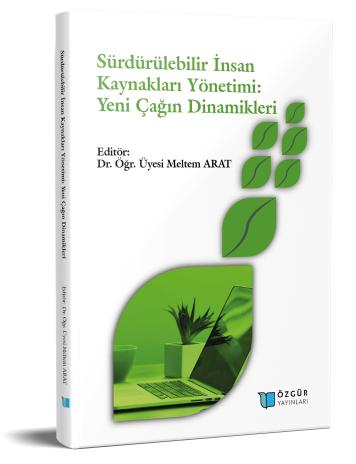
Sustainable Human Resources Management: In Relation to Green Human Resources Management
Chapter from the book:
Arat,
M.
(ed.)
2025.
Sustainable Human Resources Management: Dynamics of New Age.
Synopsis
Sustainability has become a holistic approach that encompasses environmental, social, and economic dimensions within the strategic management of businesses. Companies view sustainability both as a means of gaining competitive advantage and to fulfill their social and environmental responsibilities. In this regard, they integrate corporate strategies with ecological and social policies. The success of sustainable development depends on balanced and long-term practices aimed at protecting environmental resources, enhancing social welfare, and ensuring economic efficiency.
The purpose of this section, which addresses the reflections of the multi-dimensional perspectives brought by sustainability on business organizations and employees, is to analyze the relationship between “Sustainable HRM” and “Green HRM,” and to evaluate the strategic and structural contributions that the practices addressed by these two concepts from a holistic perspective can provide to organizations. In this context, the similarities and differences between the two concepts are examined within a systematic framework. In addition to the impact of HRM policies based on environmental responsibility and sustainability on organizational strategies is investigated. Restructuring HR practices in alignment with ecological, social, and economic sustainability principles stands out as a strategic necessity for achieving the vision of corporate sustainability. Sustainability has become a holistic approach that encompasses environmental, social, and economic dimensions within the strategic management of businesses. Companies view sustainability both as a means of gaining competitive advantage and to fulfill their social and environmental responsibilities. In this regard, they integrate corporate strategies with ecological and social policies. The success of sustainable development depends on balanced and long-term practices aimed at protecting environmental resources, enhancing social welfare, and ensuring economic efficiency.
The purpose of this section, which addresses the reflections of the multi-dimensional perspectives brought by sustainability on business organizations and employees, is to analyze the relationship between “Sustainable HRM” and “Green HRM,” and to evaluate the strategic and structural contributions that the practices addressed by these two concepts from a holistic perspective can provide to organizations. In this context, the similarities and differences between the two concepts are examined within a systematic framework. In addition, the impact of HRM policies based on environmental responsibility and sustainability on organizational strategies is investigated. Restructuring HR practices in alignment with ecological, social, and economic sustainability principles stands out as a strategic necessity for achieving the vision of corporate sustainability.

